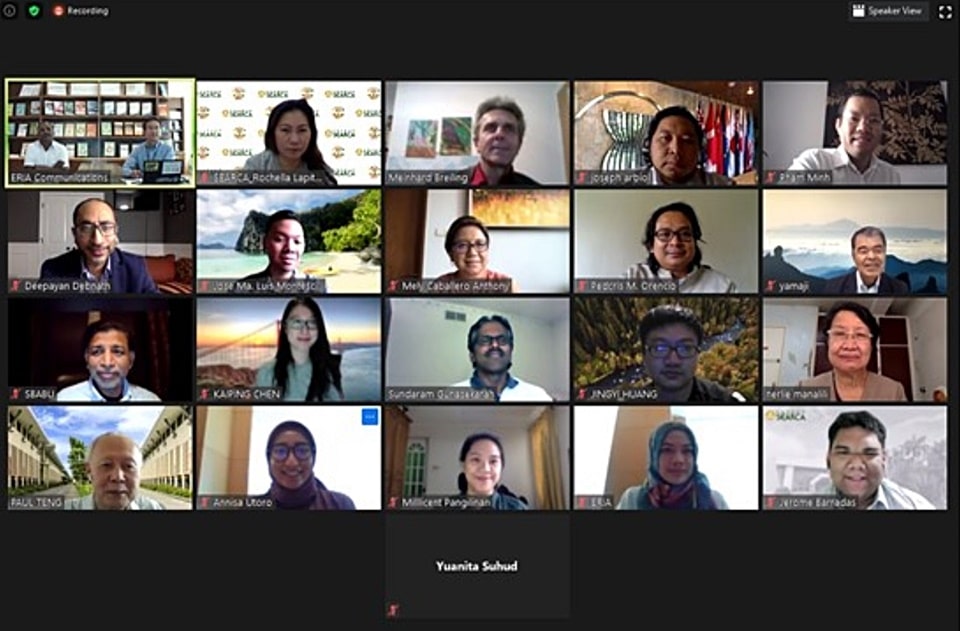Cognizant of the potential of digital solutions in transforming agri-food systems, the Southeast Asian Regional Center for Graduate Study (SEARCA) and Economic Research Institute for ASEAN and East Asia (ERIA) inked an agreement to develop the ASEAN Guidelines for accelerating the transformation of food and agriculture through digital technologies and innovations. This collaboration is in line with the implementation of the project’s Component 3 under ERIA’s umbrella project with the ASEAN Secretariat titled “Enhancing Food Supply Chain Resilience and Food Security in ASEAN with Utilization of Digital Technologies”.
The crafting of the regional guidelines will equip the ASEAN member states with policy recommendations that may spur them to have informed decisions and will likewise shape the digital transformation of agriculture in the region. More specifically, the guideline will outline conditions and actions needed for the inclusive and sustainable use of digital technologies for agriculture and food system improvements, including interventions to facilitate digital technology uptake in the agriculture and food sector.

As an inception activity, a virtual kick-off meeting was held on 27 November 2020 to strategically outline the rollout of each component’s workplans. The meeting was participated in by project partners and implementers from ERIA, ASEAN Secretariat, International Food Policy Research Institute (IFPRI), University of Tokyo (Japan), University of Missouri (USA), University of Wisconsin (USA), University of Technology, Wien (Austria), Nanyang Technological University (Singapore), and SEARCA. Dr. Pedcris M. Orencio, Program Head for Research and Thought Leadership (RTL) presented the identified activities and their schedules under Component 3 as well as the proposed annotated outline of the ASEAN guidelines. Other delegates from SEARCA include Component 3’s project team members namely, Dr. Nerlita M. Manalili, Technical Consultant; Ms. Millicent Joyce Q. Pangilinan, Technical Specialist; Mr. Jerome Cayton C. Barradas, Special Project Coordinator, Agriculture, Forestry, and Natural Resources (AFNR) Knowledge Platform; and Ms. Rochella B. Lapitan, Program Associate of RTLD, also joined the virtual kick-off meeting.
While the implementation of the three components will be done in parallel, the outcomes of Component 3 will gather the results of Component 1 and 2 to provide evidence-based policy insights on the formulation of the draft guidelines. Component 1, with IFPRI as the lead implementer, will provide macro data analysis on the estimation of the overall impact of COVID-19 on agricultural production and food value chain resilience in the ASEAN region. On the other hand, Component 2.1 composed of research institutions from the University of Tokyo, University of Wisconsin, and the University of Technology, Wein, will undertake technical needs assessment tasks. This shall be complemented with the analysis of new trends and best practices models for integration of digital technologies, and enabling policy environment for agriculture, trade, and information and communication technologies that will be carried out by Component 2.2, with Nanyang Technological University as the lead.
Digital technologies and innovations are evident to support the ASEAN Economic Community (AEC) in transforming to a more resilient and sustainable agriculture and food system. However, the varying capacities among the ASEAN Member States (AMS) create a digital divide in the digital ecosystem. Hence, the project has seen the need to establish a digital technology platform at the regional level that will allow access to different stakeholders. The ASEAN guidelines is expected to facilitate digital inclusion on the use of innovative technologies that would help farming families in the AMS to deal with agriculture and food production challenges sustainably. These development interventions are also indispensable in assessing the impacts of the COVID-19 pandemic that currently affect the ASEAN food and agriculture sector.
As being mandated in its 11th Five-Year Plan, SEARCA commits to contribute in transforming farmers with a new mindset that operates in a modern agriculture ecology – Agriculture 4.0. Thus, its new partnership with ERIA intensifies its strategic intent to accelerate transformation through agricultural innovation that elevates the quality of life of farming families. The project is expected to be completed in October 2021.